Bearded Dragons are one of the most common pet lizards for first time owners. One of the reasons Beardies are so popular is because they are easy to care for.
Yet, every year Beardies go through a process called brumation. Many owners find brumation confusing and do not know how to care for their dragon during this time.
Brumation is an important aspect of any Bearded Dragon’s life. It is a natural behavior that affects both pet and wild species. Owners often do not know much about brumation and ask if this behavior can be sped up, or even prevented.
In this article, we explain what Bearded Dragon brumation is. We also share important signs to watch for, so that any keeper will know exactly what to do and what not to do when their dragon brumates.
What Is Bearded Dragon Brumation?
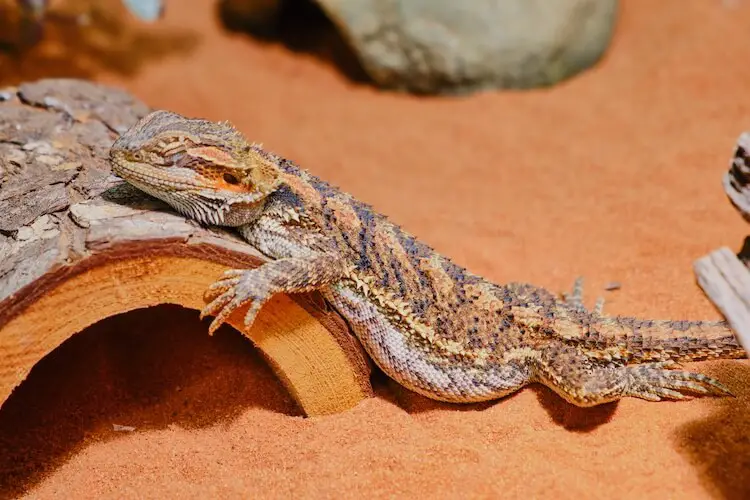
Brumation is a period of dormancy that bearded dragons use to survive during the colder months in Australia. Bearded Dragons normally brumate during the Southern Hemisphere’s winter in June, July, and August. Animals normally build a burrow and go into a deep sleep until the temperature rises again.
It is a process very similar to hibernation that many reptiles go through.
Brumation and hibernation are terms often used interchangeably, as they mean the same thing. Although brumation is associated with cold-blooded animals (e.g. reptiles) and hibernation is linked with warm-blooded animals (e.g. mammals).
For this reason, your Bearded Dragon will brumate, but will not hibernate.
Bearded dragons brumate because they cannot internally regulate their body temperature. Instead, they must use external sources to heat or cool their body. This is why you can find Beardies sunning themselves on cold days, or seeking shade and staying out of the sun in the middle of a hot day.
Many animals can survive low temperatures over a short period of time (i.e. a day or two), but when the temperature is too low for too long, survival becomes difficult, especially for cold-blooded animals.
Brumating allows bearded dragons to survive cold winters which they normally would not be able to.
Before a Bearded Dragon starts to brumate, they will eat lots of food to build up nutritional reserves. They will then live off this excess when they go into brumation.
The main difference between hibernation and brumation is how easily an animal wakes up from their deep sleep. Mammals that hibernate are difficult to wake up, reptiles in brumation are not.
If a brumating dragon’s internal temperature rises they will wake up, even if winter has not finished. This means that some bearded dragons can leave their dens during the winter if the temperature is sufficiently warm.
Keep this in mind when watching your brumating Beardie. It is likely they will not go into a deep sleep for several months at a time. Instead they will become less active, less hungry, and sleep more. They can be brumating, but not sleeping the entire time.
Bearded Dragon Brumation Signs
There are some clear, and some not-so-obvious, ways to tell if your Bearded Dragon is brumating. Your Beardie can show signs of brumation at any time, but they typically show the following signs when their tank’s temperature is decreased:
- Eating less.
- Sleeping more.
- Spending more time in a hide.
- Staying out of the basking spot.
- Staying out of direct light.
- Moving slower than normal.
During brumation, your Bearded Dragon will be sleeping much more than normal. This helps them to reduce the amount of energy they spend. Instead of being awake during daylight hours, they will spend most of their time asleep in a hide.
The increased time spent sleeping is also accompanied by a decrease in activity. Even if your dragon is awake, it will be less active during brumation.
Another common sign is a decreased appetite.
Bearded Dragons use their fat reserves to survive brumation. Because of this, they do not need to eat as much as usual. This lack of eating will subsequently be followed by a lack of poop.
Many signs of brumation can also be signs of health issues. You will need to keep a close eye on your Beardie during this time.
A healthy bearded dragon will weigh between 300 to 500 grams. They should not lose more than 50 grams of body weight during brumation. If you notice signs of rapid weight loss, or if they begin to look thin and malnourished, then check for parasites or major health problems.
What Age do Bearded Dragons Brumate?
You may be thinking, “At what age will my bearded dragon brumate?”
Unfortunately, that question cannot be answered with any certainty. In most cases, a bearded dragon starts to brumate between 10 to 24 months of age.
But, every Bearded Dragon is different.
Many bearded dragons brumate earlier than others, and some may not brumate until three years old – if at all. There is no way to predict whether or not your bearded dragon will brumate.
Oddly enough, even if a bearded dragon begins brumating one year, it may not do so in the following year. So, it’s difficult to predict when the brumation period begins for each individual bearded dragon.
One thing that can be answered for certain is baby Bearded Dragons (under nine months) should not brumate at all.
It is normally better to keep Beardies awake during their first winter by increasing basking temperatures to around 105°F.
When Beardies brumate they greatly reduce the amount of food they eat. In younger species, or individuals that are not a healthy weight for their age, this can be unhealthy and dangerous. They may not have enough reserves to stop eating and survive for a few months.
How Long Does It Last?
Brumation is a period of dormancy based on seasonal cycles. It will normally last as long as the Australian winter does. In most cases, Bearded Dragon brumation lasts for one to three months. You should expect them to sleep anytime from early June until September.
If they do not brumate according to Australia’s seasonal patterns, they will likely brumate according to their tank or personal conditions.
For several months expect your Beardie to be sleeping and rarely coming out for water.
Brumation is not a fast process. Bearded Dragons do not go partly into brumation, this is a common myth. They either are, or are not brumating.
What To Do When Bearded Dragons Go into Brumation
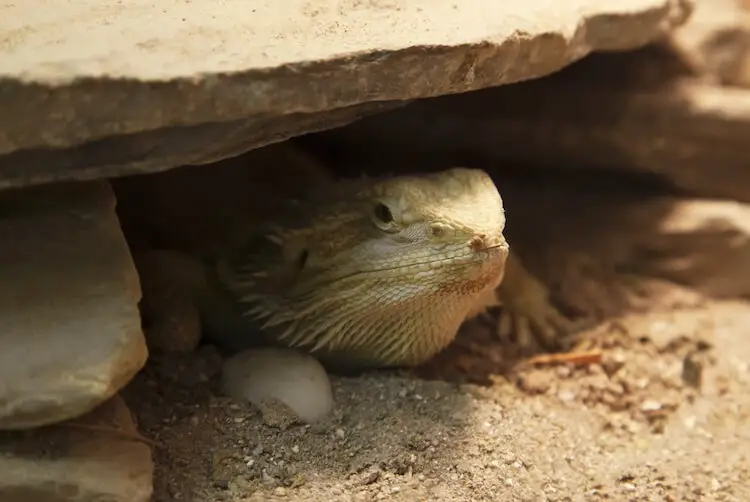
Caring for a Bearded Dragon during brumation is hands-off for the most part. But there are still some things you can do to provide the best environment for your pet.
Bearded dragons slow down in pace, avoid their basking spot, and spend more time in their hide (for a week or more) when they begin brumating.
The first step is to turn off the basking light and heating sources.
One week after you stop feeding your bearded dragon, gradually reduce the lighting and UVB bulb from 14 hours each day until it is completely off. This helps to replicate the naturally cooler temperatures and reduced daylight hours in its natural habitat.
Do not worry about their tank becoming too cold. Remember, brumation involves sleeping through the cold winter months. Turning off your lizard’s heat and UVB lighting will not cause any problems for your bearded dragon’s body temperature. Shoot for daytime and nighttime temperature ranges of 60 and 60 degrees Fahrenheit.
Next on your to-do list is water. There should be no change to this aspect of care.
Make sure that your beardie has access to clean, fresh water. It should always be available, whether or not they drink it. While your bearded dragon may appear to be playing dead for long periods, it actually still requires nourishment when in full-brumation mode.
If you notice your Beardie is out of its hide during brumation, you can offer him some food. Most will normally refuse food, so do not be surprised if this happens. However, some will be hungry and may want to eat. If they do eat, turn on the lights and heater for the day to help them digest it.
Finally, you will need to keep their enclosure clean. Because your Beardie will not be eating very often, keeping the enclosure clean during brumation is much easier.
Bathing your Bearded Dragon during brumation is a common myth. You do not need to do this. Wild species are not bathed and pet species should not be either. As long as you provide fresh water, they will not become dehydrated.
Brumation is a daunting process for first-time keepers. If you follow the basic rules above your Beardie will brumate in a safe and healthy environment.
What Happens After Your Bearded Dragon Wakes?
This is the easy part, everything should go back to normal.
Once they wake up, they will be ready to act as if nothing happened, and so should you. When you see them come out of their hide, get them back on their usual feeding, heating and lighting schedule.
If your Bearded Dragon was a healthy weight, it should be almost the same as they were before brumation. If you have followed the brumation tips in this article, there will be no need to monitor your Beardie any more than usual.
How To Wake Up A Bearded Dragon from Brumation
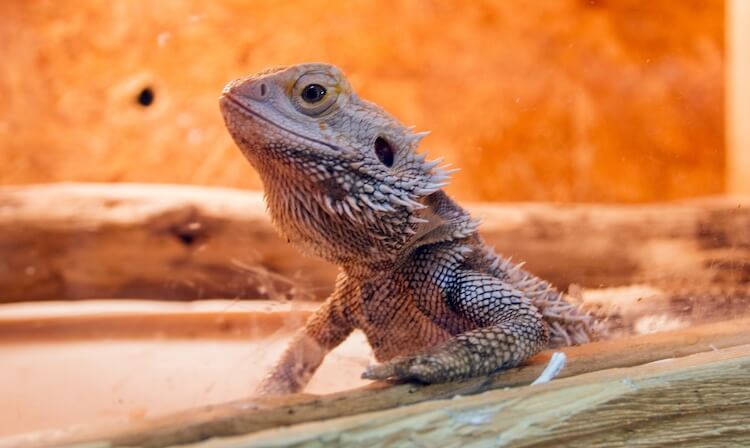
There is no good reason to wake up a Bearded Dragon brumating. You should always allow your dragon to wake up naturally. Never try and wake them up by increasing the tank temperature.
Once your dragon has started brumating, there is not very much you can do to stop it, nor should you make any attempt to disrupt the dragon during any stage of the brumation period.
Instead of trying to wake up your dragon, focus on ways to make the process healthy for them. Turn off the heating and lighting and make sure they have access to a clean water bowl and a dark secure hide.
Bearded Dragons have been brumating in the wild far longer than humans have been caring for them as pets. There is no need for you to physically intervene if you want a healthy dragon when the brumation period is over.
The ‘best way’ to wake up your Beardie is to prevent it from brumating in the first place.
Unless they are sick, under nine months old, or do not have enough body mass to brumate safely, you should not try to stop this process from happening.
Repeatedly waking your lizard in an attempt to stop brumation can actually cause them to brumate for longer.
If you want to try and prevent bearded dragon brumation, then make sure they are not exposed to winter-like conditions in their habitat. As it gets closer to brumation, increase the basking temperature to above 105°F and keep the lighting on for 14 hours a day.
However, we have no control over the brumation period or duration, and there is no guarantee that any of the steps above will work. Some individuals will go into a deep sleep regardless of what you do. If this happens, let them sleep.
Is A Bearded Dragon Dead, Sick or Brumating?
Understanding if your Bearded Dragon is sick or brumating can be hard, especially for first-time keepers.
Common illnesses such as parasites present very similar symptoms to brumation.
During brumation, your bearded dragon will not be eating much food. But, they should not be losing much weight too. Most adults weigh between 300 and 500 grams, they should not lose more than 50 grams during brumation.
If you lizard experiences weight loss rapidly, and its muscle mass decreases noticeably, then it is more likely to be sickness and not brumation.
You can weigh your Beardie to keep track.
Most adult Bearded Dragons will lose only 5 to 30 grams during brumation.
If your lizard is not eating, slowing down, and spending time in a hide, but also shows signs of a bad shed or sunken eyes, these are not symptoms associated with brumating.
Once you have a good idea of what brumation is, and have been through some with your Beardie, you will begin to see the difference between signs of brumation or illness.
Do Bearded Dragons Eat or Drink During the Brumation Period?
Yes, but not very much.
Remember that your bearded dragon is completely dormant during the brumation period. Instead, brumating bearded dragons will sleep for much longer than usual to save energy during what would normally be cooler temperatures in the wild.
Your bearded dragon will sleep longer but still require food and water. If it loses too much weight or has stopped eating altogether, your bearded dragon may require professional medical assistance.
Summary
Brumation is a period of dormancy similar to hibernation where Bearded Dragons sleep for an extended period of time. Bearded dragons go into brumation for one to three months which helps them survive the colder seasons when hunting and survival are difficult.
A bearded dragon barely eats, moves, drinks, and has fewer bowel movement cases during the brumation process. During these few months, lighting and heating are not necessary, so should be switched off to replicate natural conditions.
Brumation is common in pet species and many breeders encourage it for healthy breeding. However, not all dragons brumate. They may start at a young age, but your bearded dragon may not brumate at all.
Never try to attempt to wake a bearded dragon that is brumating. Instead, focus on ways to help the process go as smoothly as possible such as providing fresh water and keeping their tank clean. Increasing the basking spot temperature to 105°F can sometimes prevent brumation, but this should only be done for babies under nine months old or individuals who are underweight.
Do you have experience with brumation in Bearded Dragons, or other species of reptile? Let us know.

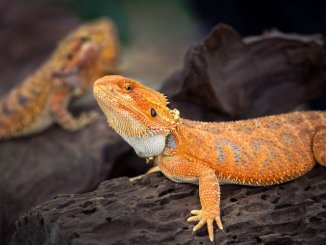
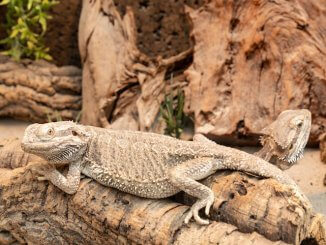
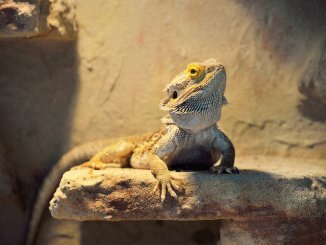

Hi!
I’m a first time beardie owner, and I just got him home 3 days ago. he is 1.5 years old, and has lived with a sweet couple up until I bought him. But when we moved his terrarium his heat lamp broke and the stores were closed because it was late, so he did not have a basking spot for 12-16 hours. is that something that could “kickstart” brumation or is it possible that he is sleeping a lot because moving was a “big experience”?
Hi Clara,
In my experience (I have had my dragon for 5 years) when I move him to a new place, he usually hides for a few days. Usually 12-16 hours without heat isn’t a big deal for them (then again, I am not a vet nor trained professionally in beardie care!).
Do you have any suggestions on how to get oral medication into a brumating beardie? My guy is being treated for yellow fungus. Since he is refusing to eat, it is making it very difficult to get him to take his meds. He was at the vet last week and the vet confirmed he’s brumating and not sick.
Stephanie what you need to do is go on YouTube and there’s two people on there and they’re awesome and there is a mixed slurry Google and you can make that for your dragon and put the medicine in there and put it in a syringe that you give medicine put it in the side of the mouth and feed him slow
Hi, we’ve had our beardie for a little over two years now, and during June while outside playing, he wandered off and got lost, we searched for days and couldn’t find him for three months, and when he was found, the tip of his tail seemed frost bitten, and slowly he seems to be losing more of it, it was roughly 1/3 of an inch, and now it is 1 inch that is seemingly dead, and is scales are coming off, do you have any answer or advice of what to do or what is happening
Poor thing! three months is a long time alone.
Your Bearded Dragon is most definitely suffering from tail rot, which happens usually after an injury to the tail, periods of intense stress or dietary deficiencies. Considering he was lost for 3 months, all of these could easily apply to his case. It usually needs to be treated with a Vet. If you are not able to visit one, you can treat it with betadine (3 parts water, 1 part betadine), in which you’ll soak the tail for 5 minutes on a daily, until you see positive changes.
I can’t figure out if she is sick or brumating 😭 first time owner she is a rescue. Please help
It is sometimes difficult to tell! The first encouraging sign is that it is winter, and she might be looking to go into brumation. Check for other behaviors: is she generally losing appetite? Has she shown decreased activity during the day, spending a long time in her hide? She perhaps tried to create a burrow in the substrate? These are all signs of early brumation, so if she’s otherwise healthy, you got nothing to worry about!
Trying to determine if my beardie is brumating or dying.. I strongly believe it’s in burmation but I would like clarification
If you see a large reduction in daily activity, in basking time and in appetite in the winter months, this is easily attributable to brumation. However always keep an eye out for more worrying signs such as unusual looking color, green urea, head-shaking, complete inactivity etc…
ok ok ok so I have quite the situation, my beardie has been brumating well over 3 months… well over 5 probably. She seems healthy and the vet even says she’s healthy for a dragon that’s not eating nor basking. She wanted me to orally feed her but I thought if she’s brumating I definitely don’t want to put food in her stomach that will later just rot and cause more problems for her and a bigger vet bill for me. Overall she seems healthy not lost much weight it’s just the time she’s been brumating. Vet says she’s not egg bound (doesn’t show signs nor is active enough to be digging) and parasite tests ere negative. Vet did find a lump but is not concerned so I’m not sure what to do. She is awake but still in her hide as well. Any suggestions?
You don’t need us, that was spot on!
Having said this, if we’re truly talking about a 5 month affair, you might want to feed her a little bit more, invite her over to the warmer part of the enclosure (which should be heated at 95-105°F), and see if her activity levels and appetite grow back up.
I have a bearded dragon that is going through brumation currently. She is also a classroom pet. Is it uncomfortable for her to travel back and forth during brumation? I don’t want to leave her in my classroom enclosure overnight because it’s too cold in the building (they turn off the heat when students leave).
It would be better to avoid moving her that much during brumation. You should first of all consider how cold does it actually get at night? Not just in the room, but inside her enclosure.
During brumation, a nighttime temperature of 60°F is well inside the Bearded Dragon’s temperature range, and what this species would experience in its natural habitat. It probably doesn’t get colder than that overnight, so it should be fine… unless you’re from Alaska, in which case you might wanna take her home and keep her there…
Hi, This is my first time caring for a beardie before so I’m not sure what my beardie is doing? My beardie has been sleeping since tuesday morning. He was active monday and awake. He barely eats. I barely see him move. He is at his basking light when I see him most of the time, but he also moves to his castle as well. He is alive. He is about 5 or 6 years old. I’m not sure if this is brumation or just sleep
I believe your Dragon is brumating, although it is difficult to discern at times. The symptoms seem consistent with brumation, but if you want to rule out other more worrying things, check for other symptoms that he might be unwell, like a color change, strange-looking poop, avoiding certain areas of the enclosure and so on
so my beardie is active and healthy but he stopped eating and hes not burmating because hes active and he still basks but he just wont eatso i was wondering if i could do something with him that would get him to eat dont have any money to take him to a vet so thats out of the picture so sadly i need help ASAP anything will help i need help so feel free to leave comments. please help!!
How long has this been going on? Generally speaking, an active Bearded Dragon that refuses food for a 3 to 4 days is nothing to worry about. I would recommend you try to offer different food items and varying the relative amount of insects and greens you’re offering him. Make sure you have a calcium supplement to sprinkle on your food. To rule out more concerning effects check his feces (we have an article on this topic: https://www.everythingreptiles.com/bearded-dragon-poop/), and his behavior in general. If he turns inactive, starts glass surfing, feels threatened in your presence, you might want to reconsider my diagnosis. Lastly, remember that as a Bearded Dragon grows to be an adult, he might start needing food less frequently.
Hi, my Beard (Biscotti) may be bruiting, but his eyes always open, he is in the corner of colder side of the terrarium, under the half log, but head raised up out of the log, so it’s hard to say if he’s bruiting or not. I have such a hard time getting my tank to above 100 degrees. It is a large tank, 2′ x 4′. I have a large double dome that has a 150w ceramic heater on left and a light up heater on right side. I also added a small dome with a 75w on the left side too. The right side has a long UVB. I feel like maybe it’s not hot enough, it’s like 95 to 97 on the left side and 85 on the right. I’m always worried. I give fresh water and food every day but he’s not coming out. He looks healthy, but the fact that his eyes are open, but just not coming out from the corner worries me.
Hi Theresa. You mean brumating, right? First of all, do not take brumation as the equivalent of sleeping. It is a period of general inactiveness and low metabolism, but his eyes might be open for long periods of this time. So, especially considering you have a hard time heating up the tank, couldn’t this be brumation?
If it was too cold (although you seem to be keeping it within range), you would see him more often trying to bask in the sunlight, trying to get that warmth he misses. If he doesn’t leave his hide, he might not want to, or he might have other issues keeping him there. How is his appetite? Feces? Behavior in your presence?
Also please consider that you might need to change your UVB bulb if you’ve had it for months. This is a common problem in reptile keeping, as UV is often unmeasured, contrarily to temperature and humidity. UVB bulbs need regular changing.
Hope this helps!
I’m very new to owning a bearded dragon and I don’t know if she’s brumation or just lazy I’m just worried that she might be sick
What symptoms have you observed beside laziness? Generally speaking, if some eating and (normal-looking) pooping occurs, and she doesn’t spend 100% of time in her hide, she should be fine. Try supplementing calcium and vitamins with her food. Check whether temperature and humidity levels are inside the range.
So many questions! Our Beardie, Luci, thought she was a Lucifer but turns out SHES not… she about 18mos old and is usually active but lately she has shown NO interest whatsoever in her dubia roaches or her favorite snack blueberries. I’m wanting to think it’s brumation… she has a shelf in her enclosure on the “cold” side and she doesn’t really move from that spot. She picks her head up every now and then to see what’s going on, but other than that, she’s like a bum on a log. So questions: with slowly shortening her light times, how do we know she’s ready to have her lights back on? Afraid with them being off for too long will cause her harm in some way. Do we have fresh food in her enclosure every day or just as needed? She been acting like this for about 2wks or so now. If she’s hitting brumation, is it ok to take her out now and clean her enclosure before she hits full brumation? Sorry for all the questions, she’s our first one and I’m freaking out and she’s not even mine, she’s my husbands. Any advice would be greatly appreciated!
I’ll try to briefly answer to some of your questions. The signs seem to suggest brumation, yes, and you can help this process by shortening light times. When to bring them back to normal? Observe her behavior to look for signs the she might be ready to wake up (more activity, appetite, time spent in the ‘sun’), but ultimately you’re going to be the ruler of light and temperature so it is up to you when to ‘artificially’ bring those lighting levels back up to normal. If she starts being harmed by lack of light or cold she will take actions in that regard as long as she has the option of a lazy half-basking session (but this might not happen for the whole brumation period). Deliver food as needed. She won’t be eating every day. Any uneaten food should be removed (as always). Lastly, about cleaning, it sounds like she’s too far into the brumation period to go for a full scale cleaning. You might have to go for a spot cleaning but this depends on her familiarity and easiness with you.